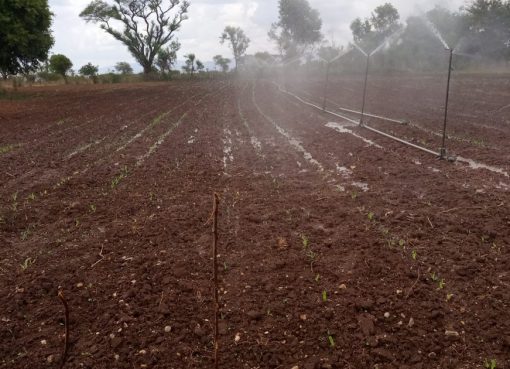
Salgaa-Sachangwan stretch. Photo by KNA.
Five traders have been netted as the National Environmental Management Authority (NEMA) intensifies battle against resurgence of plastic bags in Nakuru County.
It has emerged that barely a year after their use was banned; plastic bags believed to be smuggled from outside the country are back on the market, especially among small traders vending fruits, vegetables, meat, milk and paraffin.
The crackdown that caught traders along Salgaa-Sachangwan stretch on the Nakuru-Kisumu Highway unawares on Wednesday was coordinated by NEMA Enforcement Officers, Daisy Mwangi and Brian Ochieng backed by police officers.
“We apprehended them as they were in possession of banned plastic bags. They will be arraigned in court after investigations to establish the source of the bags”, said the officers
If found guilty, they could be fined between Sh. 2 million and Sh.4 million, get a jail term of between one and two years, or both,” said Ms. Mwangi.
She said majority of those arrested were using the plastics to package sugar cane which is sold to motorists and commuters along the busy highway.
Ms. Mwangi lamented the existence of a well networked cartel, which alerted suspects targeted by the environmental management agency during crackdowns.
Most of those who have been arrested following the ban are small scale traders. It has been established that although they may not be directly involved in large scale importation of the banned plastic bags, they remain the most daring when it comes to using the bags as packaging material.
Plastic bags were introduced in Kenya in the 1962 as a simple solution for packaging but over the year, they have become a major source of pollution.
Ochieng said the crackdown will also target individuals still hoarding the plastic bags and selling them late at night.
He warned that traders wrapping food in the banned bags will not be spared.
The operation which the enforcement officials said will be conducted fortnightly will also be extended to the Main County markets, butcheries, retail shops, dairies and groceries.
“Many traders are now compliant and support the ban because they know the effects of plastics on the environment, drainage systems in particular.” he added.
Most of traders defying the ban, NEMA officials observed, constantly turned violent during crackdowns and that some of them were notorious repeat offenders.
Our enquiries from various traders revealed that the bulk of the plastic bags doing rounds in and out of Nakuru County are manufactured by a company in a neighboring country.
The National Environmental Authority (NEMA) is resolute that it was keen to curtail resurgence of plastic bags but could not confirm or deny whether they are indeed being smuggled into the country from neighboring states.
The NEMA Director-General, Geoffrey Wahungu said the authority was engaging environmental authorities in neighboring countries on the matter.
“We are aware of the developments; these are criminals who are trying to test the system. We are prepared to continue enforcing the ban,” said the director- general who urged Kenyans to remain vigilant and help stop the use of banned carrier bags.
Ochieng said environmentally friendly bags are now in the market and urged customers to use them instead of using the banned bags.
He said those defying the ban are doing so at their own risk as NEMA carried out sensitization work and it was now time to implement the ban to the letter.
“We have stepped up these operations to ensure 100 percent compliance with the law. This is just the beginning and we are not going to relent in the efforts to ensure our environment is free of these papers. Kenyans have been encouraged to use alternative bags such as those made from paper, cloth and sisal,” he said
In Soko Mjinga and Ponda Mali Markets, the traders keep the bags off display to avoid detection and only remove them when serving customers.
The traders, however, inform customers to carry the bags visibly at their own risk, an indication they were aware of the ban.
“Initially, I was uncertain whether to package meat in them or not. I know the consequences if caught but most of traders here have resorted to them albeit discreetly. We petition the government to ensure that alternative environmentally friendly packaging material is readily affordable and available” said Ben Karanja, a butcher in Bondeni-Centre area on the fringes of Nakuru Town
Three Kilometers away, at Free Area open air market, fruit and vegetable vendors were busy packing their products in flat plastic bags as two young men walked out of a nearby shop with groceries packed in the banned carrier bags.
The Former Environment Cabinet Secretary, Judi Wakhungu banned the use of single-use plastic carrier bags and flat bags used in household and commercial packaging plastics through a Kenya Gazette notice on February 27 last year.
This gave manufacturers six months until August 28, 2017 to clear their stock when the ban took effect. The ban covers the use, importation, or manufacture of plastic bags in a bid to reduce pollution evident in choked rivers, farms and emaciated livestock.
Officials said the ban will be more effective if all countries in the East African Community impose similar laws with similar penalties.
Uganda tried ban in 2014, but plastics have mainly crept back in shops even as the ban remains officially in place.
Rwanda is the only country which has successfully imposed the ban and travelers arriving at the country’s ports of entry are often asked to relinquish any plastics before entry. Tanzania and South Sudan are yet to enforce the ban.
Ms. Mwangi said NEMA has come up with strategies to dismantle black market racket that is keen to rake in huge profits through manufacture and sale of the banned plastic bags.
“We are putting on notice these offenders that they are flirting with jail terms and heavy fines by secretly stocking and selling plastic bags. We have received adequate intelligence reports and it is a matter of time before we catch up with them,” warmed Ms Mwangi.
In some retail shops within major residential estates, plastic bags are being sold like some black market product. Such traders only use them to package purchases of familiar customers.
“I always see one or two people with them. Where they get them from I do not know, but they are somehow still in circulation,” observed Calvin Ochieng a barber at Kaptembwa Estate.
By Anne Mwale





